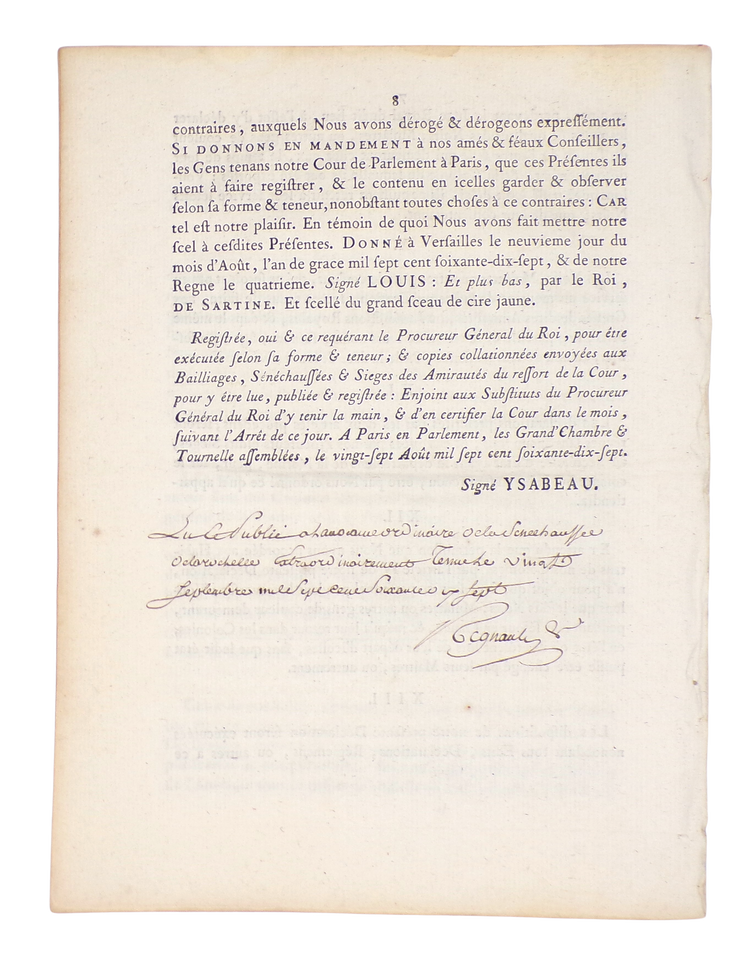La police des Noirs, 1777.
- Regular price
- €1.900,00 EUR
- Regular price
-
- Sale price
- €1.900,00 EUR
- Unit price
- per
Banning non-whites
The peak of Western institutional racism
France: Louis XVI (1774-1792).
Déclaration du Roi, pour la police des Noirs. Donnée à Versailles le neuf août 1777. Registrée en Parlement le 27 août 1777.
Paris, chez P. G. Simon, imprimeur du Parlement, rue Mignon Saint André-des-Arcs, 1777.
4°. 8 p. With a woodcut royal vignette on title page, a headpiece and an initial.
Sewn.
First edition of the Police des Noirs — a foundational and deeply repressive royal decree issued in 1777, marking one of the most radical assertions of racialised immigration control in pre-revolutionary France. This edition includes an engraved title-page vignette and headpiece. 4to, 8 pp., a few spots, but overall a crisp and well-preserved copy. Paris: P.G. Simon.
Issued in the early years of the American Revolutionary War, the Police des Noirs significantly reinforced earlier edicts of 1716 and 1738 by explicitly targeting individuals by race rather than legal status. The decree banned “all Blacks, Mulattoes, or other people of colour, regardless of gender, from entering the kingdom under any circumstances or pretexts.” The first article imposed a fine of at least 3,000 livres on anyone—French or foreign—who brought a person of colour into France. The second article prohibited their presence in the kingdom outright unless they were in service.
Crucially, Article IV made a narrow exception for colonists, permitting them to bring one Black or mixed-race servant for the duration of their visit, on condition that the individual be surrendered to the port’s designated depot and remain there until deportation. Article V imposed a 1,000-livre fee for this permission.
As Peabody notes, the declaration is striking in its avoidance of legal terminology related to enslavement: “slave” and “free” were deliberately excluded from the law’s language. From 1762 onward, French law increasingly framed Blackness itself—not enslaved status—as the object of regulation. The Police des Noirs thus stands as a prime example of how institutional racism was encoded into the legal framework of the Ancien Régime, just over a decade before the Revolution would proclaim Liberté, Égalité, Fraternité.
This version differs slightly from the copy held at the John Carter Brown Library (1-SIZE EB .W&A 1885), with the text identical but the typesetting, especially the title page, notably different. Rare in the trade, with only one copy recorded at auction.
Condition: in very good condition. A small contemporary ink inscription in top corner of title and a three line ink inscription at the end of the final page, reading:
Lu cet Publié a l[’]audiance ordinaire de la Senechaussee [sénéchaussée] de La Rochelle Extraordinairement Tenue le vingt septembre mil sept cent soixante & sept [1767]. Regnault.
Regnault was a prominent family in La Rochelle, the gateway to the West Indies.
Literature: Sue Peabody, “Race, Slavery, and the Law in Early Modern France.” In: The Historian, vol. 56, no. 3, 1994, pp. 501–510.
Couldn't load pickup availability
Share




Contact
Email: hugo@artemrarebooks.com
Phone: +31651042297
Visit us on appointment at:
Former US Embassy
Lange Voorhout 102
2514EJ
The Hague (The Netherlands)
Shipping address:
Nannie van Wehlstraat 51
2548MN
The Hague
The Netherlands




